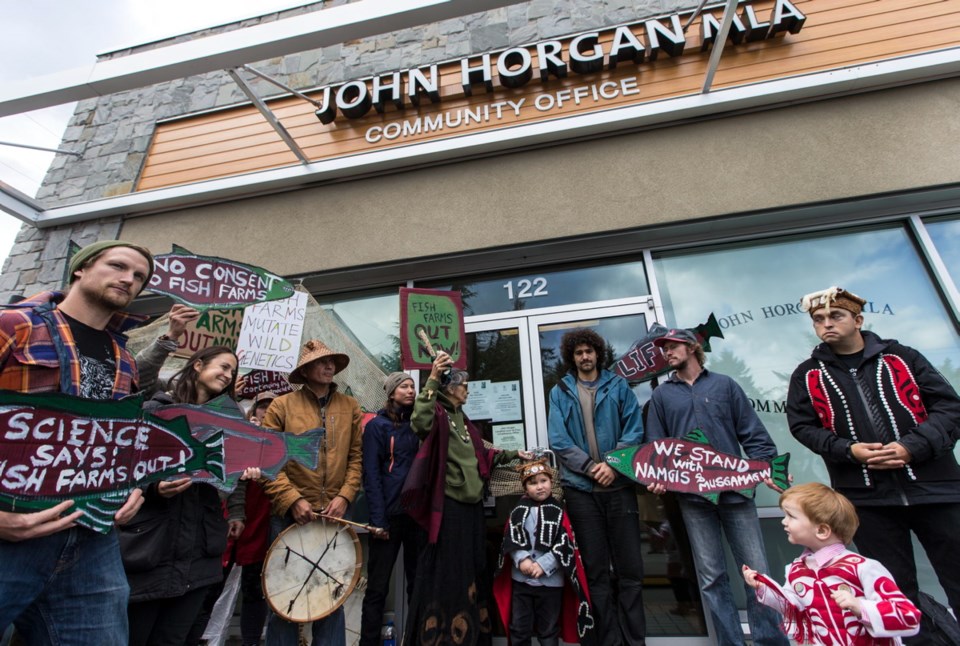Protesters descended on Premier John Horgan’s Langford constituency office Friday to call for an end to open-net fish farming along wild salmon migration routes.
The non-violent demonstration came the same day that RCMP escorted workers restocking a fish farm near Alert Bay, where Horgan this week met with First Nations to talk fish farming. A protest has been set up near the site for months.
Debates about open-net fish farming have simmered for decades, but with a new government in power, players on both sides of the issue say they’re hoping for some resolution.
“This is a demonstration against the NDP to say: ‘You need to pick a side, and we hope you pick the right side,’ ” said Graeme Dousada, a member of advocacy group Fish Farms Out at Horgan’s office Friday.
Opponents of open-net fish farms, which allow water to flow freely between pens holding farmed fish and the natural marine environment, say they allow diseases and parasites to be passed to wild stocks.
Some First Nations have also argued that aquaculture companies are operating in their traditional territories without their permission.
But there’s high value on the industry. A consultant’s report for the B.C. Salmon Farmers Association said the industry has 2,966 direct employees. The wholesale value of its salmon was estimated at $796.6 million last year.
Horgan visited the ‘Namgis First Nation in Alert Bay on Tuesday, along with Agriculture Minister Lana Popham, Indigenous Relations and Reconciliation Minister Scott Fraser and Transportation Minister Claire Trevena, who is the MLA for the North Island.
While campaigning, Trevena told a gathering in Alert Bay that if her party formed government, it would “make sure that these territories and the North Island are clear of fish farms,” according to a local media report.
No such commitment was repeated Tuesday.
Instead, Horgan said Popham would share the First Nations’ concerns with the federal Department of Fisheries and Oceans, which has jurisdiction over aquaculture licences, while working toward a solution.
“Any strategy for aquaculture must put a priority on the protection of wild salmon, collaborate with First Nations and acknowledge their interests, involve the federal government and recognize that the industry now generates nearly $800 million in annual value, while supporting several thousand jobs in rural and coastal areas,” Horgan said in a statement.
Horgan, Popham and Trevena were not available for interviews Friday.
On Friday, RCMP escorted Marine Harvest Canada workers as they restocked its Port Elizabeth farm, where protesters and First Nations have been for months, said company spokesman Ian Roberts.
“We asked RCMP to attend to ensure cooler heads prevail,” Roberts said.
Marine Harvest Canada operates within the traditional territories of 24 First Nations. It has protocol agreements with 15 of those First Nations and seven First Nation-owned businesses. The company employs more than 550 people on and around Vancouver Island.
It has operated in the Broughton Archipelago waters for 30 years, Roberts said.
He said the company wants protests replaced with formal discussions around a boardroom table.
“We’ve asked that the governments — First Nations, federal and provincial governments — start to have these very important discussions so it can create some certainty, not just for our business, but others operating in B.C.” Roberts said.
Chief Ernest Alfred, who is traditional leader of the ‘Namgis Nation, said he was “a little heartbroken,” to be watching a fish-farming transport vessel restocking the Port Elizabeth farm. Friday was the 51st day he had been protesting the fish farm.
Alfred had hoped the province would prevent the restocking, since the 10-year provincial lease on the ocean bottom expires in June and the fish will live for two years. A separate farming licence issued by the federal government expires in 2022.
“We were really hoping we would hear from the province and that they would cancel this licence, so this could not happen,” Alfred said.
He said he was disappointed there was no commitment from the NDP leader or ministers, beyond “listening” and talking to federal counterparts.
“We’ve had premiers and politicians visit the Alert Bay Big House before, but never to make promises,” Alfred said.
“My message to the B.C. NDP is that they have a real opportunity to correct the mistakes of the past.”



